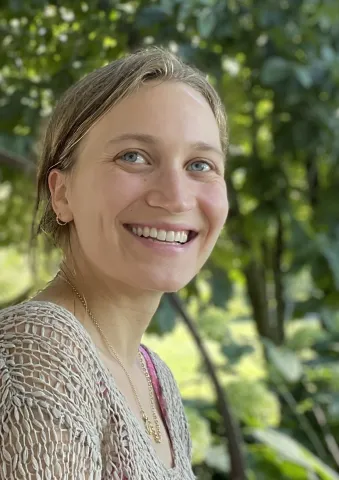
Allison Leigh Gross

The summer after college, I found myself puppeteering for preschoolers and young children. It was during this unlikely period of time that I witnessed the striking perceptiveness and porousness of young children—they possessed reservoirs of complex emotions, and were acutely impressionable. I was moved by the profound potential for informal educational strategies, such as puppet work, to not only educate, but to also act as a vehicle for uplifting and fostering confidence within children at this formative age.
My newfound adoration for puppets led me to Sesame Street Workshop, where I had the privilege of aiding initiatives that sought to improve the wellbeing of children within Syrian, Venezuelan, and Rohingya refugee communities. I was fascinated and overcome by the potential for educational strategies and curriculums to mitigate trauma’s insidious and damaging effects in childhood, and felt compelled to learn more about the ways in which education workers in crisis settings might prioritize children’s wellbeing, emotional processing, and sense of security.
The ICE/IEPA program’s intensive, research-focus was an incredible opportunity for me to dive into a niche. My research partner and I had the gift of interviewing early childhood education workers within Rohingya and Venezuelan refugee camps for our thesis, and were able to glean insight into the strategies they use to support children’s emotional health and development. Our participants shared with us the critical role that human connection, love, and care have for children that who’ve experienced trauma, and affirmed the ways emotionally-informed education and pedagogical strategies can promote generational healing.
My time in the IEPA program this past year fundamentally reoriented my worldview and approach to the work I hope to do in the field of international education. The course load trained me, from ground zero, in the basics of qualitative and quantitative research— from educational theory, to the nitty-gritty of data collection, to the nuances of grant-proposal writing. In class, my professors pushed to expand my critical and analytical thinking: how might the ways researcher bias, data limitations, or political/ institutional constraints influence the research process itself and the dissemination of findings? Operating from an ethical framework that prioritized this kind of self-reflexivity was foundational in my thesis partner and my approach to conducting interviews within the tenuous and sensitive circumstances of humanitarian crisis settings, and was a really challenging and powerful learning process.
In the coming year, I am eager to begin working as team member to the GSE’s novel Early Childhood Learning and Development Center, where I will continue my inquiry into strategies and techniques which nurture interactions in early childhood, and aid efforts to inform policies and programs that help all young children and their caretakers.
Down the road, I hope to advance the deliverance of culturally-contextualized, trauma-informed programmatic interventions for young children in humanitarian crisis settings, and advocate for international development work that is self-sustaining, and supports post-crisis communities in their autonomous, localized efforts to educate and rebuild.
My cohort members, professors, and mentors within the IEPA program elevated my level of consciousness as a researcher and global citizen, and have made me a better person. I am deeply grateful for the last year of my life, and for the opportunity to continue my time at the GSE where I believe my colleagues and peers are working to create a more equitable world.
